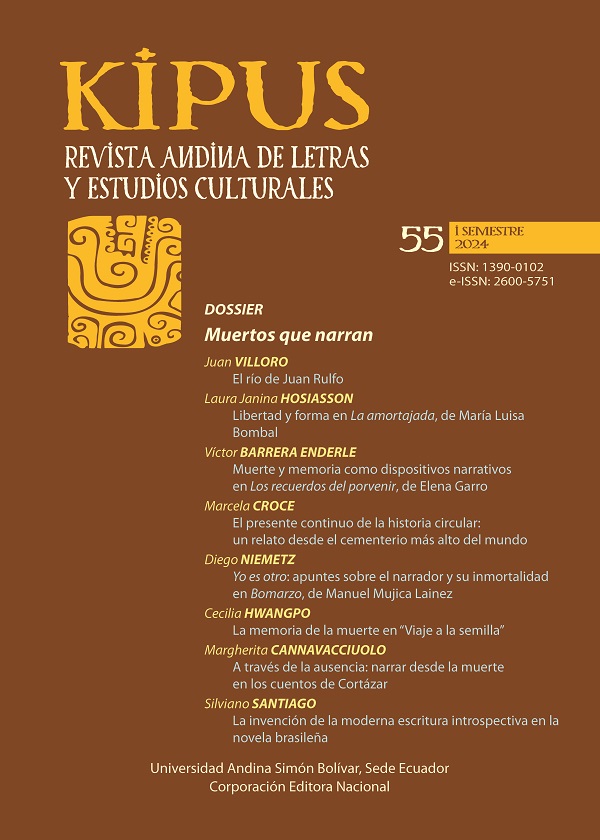The Role of Oral Tradition in the Formation of Afro-Ecuadorians’ Cultural Identity in Adalberto Ortiz’s Juyungo
DOI:
https://doi.org/10.32719/13900102.2024.55.9Keywords:
Ecuador, Juyungo, afro-ecuadorians, oral tradition, diasporic africanity, cultural identity, Adalberto OrtizAbstract
Since their arrival in the Americas, oral narratives have served Afro-Ecuadorians and other Afro-diasporic societies as a tool to preserve their ancestral memory and learn about their ancestors and their cultural legacy, hence Afro-descendants are heirs to a rich oral tradition of vital importance in their daily lives. With this background, using some theoretical conceptions on oral tradition, collective memory and cultural identity, and the interaction between them, this article aims to concisely examine the novel Juyungo by the Esmeraldas born author Adalberto Ortiz, show the role of orality, including songs, poems, proverbs, sayings, rituals, folktales, legends and other oral manifestations, in the formation of the cultural identity of Afro-Ecuadorians in the province of Esmeraldas, the main ethnic and cultural center of Afro-descendants in Ecuador, within a predominantly mestizo society that has historically imposed its cultural patterns and way of life on the entire nation, thus marginalizing the cultures of other ethnic groups.
Downloads
References
Arocha, Jaime. 2009. “Homobiósfera en el Afropacífico”. Revista de Estudios Sociales, n.º 32: 86-97. http://redalyc.uaemex.mx/src/inicio/ArtPdfRed.jsp?iCve=81511766007.
Assmann, Jan, y John Czaplicka. 1995. “Collective Memory and Cultural Identity”. New German Critique, n.º 65: 125-33. http://www.jstor.org/stable/488538.
Drewal, Henry John, et al. 2008. “Mami Wata: Arts for Water Spirits in Africa and Its Diasporas”. African Arts, n.º 41: 60-83.
Dundes, Alan. 1984. “Defining Identity through Folklore (Abstract)”. Journal of Folklore Research, n.º 21 (2/3): 149-52. http://www.jstor.org/stable/3814550.
edmolin657. 2008. “Adalberto Ortiz”. Dlettersandpoems (23 de septiembre). https://edlettersandpoems.wordpress.com/tag/juyungo/.
Estupiñán, Nelson. 2002. “Proceso de la literatura afroecuatoriana”. En Literatura afroecuatoriana: homenaje a Nelson Estupiñán Bass, editado por Alfonso Monsalve. Quito: Casa de la Cultura Ecuatoriana / Letras del Ecuador, 15-27. http://repositorio.casadelacultura.gob.ec/bitstream/34000/18874/2/CCELDE-N184-2002.pdf.
Fandom. “Yacumama”. WikiElBestiario. Accedido 4 de agosto de 2023. https://el-bestiario.fandom.com/es/wiki/Yacumama.
Fuentes, Carlos. 2011. La gran novela latinoamericana. https://www.academia.edu/26812003/Carlos_Fuentes_La_gran_novela_latinoamericana.
García, Juan. 1984. “Poesía negra en la costa de Ecuador”. Desarrollo de Base, n.º 1 (8): 30-7. https://repositorio.uasb.edu.ec/handle/10644/5291.
–––. 2002. Cantando a la salud: recopilación de arrullos, décimas y versos de las poblaciones negras del Norte de Esmeraldas. Esmeraldas: CECOMET. https://repositorio.uasb.edu.ec/handle/10644/5160.
–––. 2011. “La cultura afroecuatoriana en Esmeraldas”. Vidadelacer (1 de junio). http://www.vidadelacer.org/index.php/comisiones/vr-afro/1043-la-cultura-afroecuatoriana-en-esmeraldas-una-aproximacion.
–––. 2020. Cimarronaje en el Pacífico Sur. Quito: Abya-Yala. https://repositorio.uasb.edu.ec/handle/10644/7346.
Hidalgo, Laura. 1987. “Literatura oral popular del Ecuador: las décimas esmeraldeñas”. Afro-Hispanic Review, n.º 6 (1): 19-26. https://www.jstor.org/stable/23053954.
Howes, Rebeca. 2013. “Antonio Preciado and the Afro Presence in Ecuadorian Literature”. Tesis doctoral, University of Tennessee. https://trace.tennessee.edu/utk_graddiss/1735.
Hoy Noticias. 2003. “Juyungo es un clásico de la literatura castellana”. Hoy.com (4 de febrero). http://www.hoy.com.ec/noticias-ecuador/juyungo-es-un-clasico-de-la-literatura-castellana-136769.html.
INEC. 2010. “Resultados del censo 2010 de población y vivienda en el Ecuador: Fascículo provincial Esmeraldas”. INEC, Ecuador en cifras. https://www.ecuadorencifras.gob.ec/wp-content/descargas/Manu-lateral/Resultados-provinciales/esmeraldas.pdf.
León, Edizon. 2017. “Lectura crítica de la historia de los cimarrones de Esmeraldas (Ecuador) durante los siglos XVI-XVIII”. Historia y Espacio, 13 (48): 149-78. https://bibliotecadigital.univalle.edu.co/bitstream/handle/10893/11716/lectura%20critica%20de%20la%20historia.pdf?sequence=1.
Mansilla, Sergio. 2006. “Literatura e identidad cultural”. Estudios filológicos, n.º 41: 31-143. https://www.redalyc.org/pdf/1734/173414185010.pdf.
Miranda, Franklin. 2004. “Adalberto Ortiz y Nelson Estupiñán Bass, hacia una narrativa afroecuatoriana”. Tesis de maestría, Universidad de Chile. https://repositorio.uchile.cl/bitstream/handle/2250/108807/Adalberto-Ortiz-y-Nelson-Estupi%C3%B1%C3%A1n-Bass-hacia-una-narrativa-afroecuatoriana.pdf?sequence=4.
Monsalve, Alfredo, ed. 2002. Literatura afroecuatoriana: homenaje a Nelson Estupiñán Bass. Quito: Casa de la Cultura Ecuatoriana / Letras del Ecuador.
Montaño, Juan. 2017. “‘Juyungo’, setenta años y un después”. Rebelión, Cultura (3 de mayo). https://rebelion.org/juyungo-setenta-anos-y-un-despues/.
–––. 2022. “Mitología afropacífica: estrategia para liberar la subjetividad”. Rebelión. Cultura (3 de febrero). https://rebelion.org/mitologia-afropacifica-estrategia-para-liberar-la-subjetividad/.
Muteba, Jean. 2014. Blackness in the Andes: Ethnographic Vignettes of Cultural Politics in the Time of Multiculturalism. Nueva York: Palgrave McMillan. https://link. springer.com/book/10.1057/9781137272720.
Ojaide, Tanure. 1992. “Modern African Literature and Cultural Identity”. African Studies Review, n.º 35 (3): 43-57. https://doi.org/10.2307/525127.
Ortiz, Adalberto. 1972. Juyungo: historia de un negro, una isla y otros negros. Barcelona: Salvat.
–––. 2014. “Conceptos sobre negritud”. El Telégrafo, Cartón Piedra (17 de marzo). www.eltelegrafo.com.ec/noticias/carton/34/conceptos-sobre-negritud.
Ortiz, Pedro Lebrón. 2020. “Teorizando una filosofía del cimarronaje”. Tabula Rasa, n.º 35: 133-56. https://doi.org/10.25058/20112742.n35.06.
Pabón, Javier. 2016. “Ora-literatura afroecuatoriana: narrativas insurgentes de re-existencia y lugar”. The Latin Americanist, n.º 60 (1): 95-113. https://muse.jhu.edu/pub/12/article/705849/pdf.
Padilla, Isabel, y Juan Montaño. 2018. La palabra está suelta: homenaje a Juan García Salazar. Quito: Abya-Yala. https://repositorio.uasb.edu.ec/bitstream/10644/6161/1/Garcia%2c%20J-10-La%20palabra%20esta%20suelta.pdf.
Palmer, Colin. 2000. “Defining and Studying the Modern African Diaspora”. The Journal of Negro History, n.º 85 (1-2): 27-32. https://doi.org/10.1086/JN-Hv85n1-2p27.
Walsh, Catherine, y Juan García. 2015. “Writing Collective Memory Despite State: Decolonial Practice of Existence in Ecuador”. En Black Writing, Culture, and the State in Latin America, editado por Jerome Branche. Nashville: Vanderbilt University Press, 253-66. https://repositorio.uasb.edu.ec/handle/10644/5180.
Washington-Ba, Sylvia. 1973. The Concept of Négritude in the Poetry of Léopold Sédar Senghor. Princeton: Princeton University Press. https://www.jstor.org/stable/j.ctt13x19xb.1.
Downloads
Published
How to Cite
Issue
Section
License
Copyright (c) 2024 Kipus: Revista Andina de Letras y Estudios Culturales

This work is licensed under a Creative Commons Attribution-NonCommercial-ShareAlike 4.0 International License.







.png)
